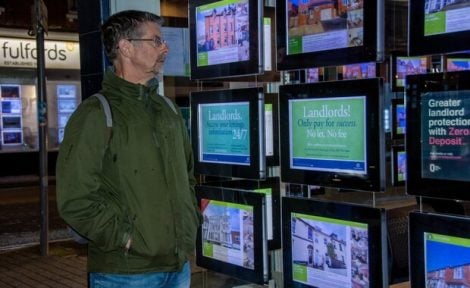Don’t let it go up in smoke
How do you stop a property becoming a drugs factory? Here’s some advice.

It hasn’t hit the headlines much lately but the menace of the cannabis factory – or farm – has not gone away, leaving landlords in the frontline for accusations of illegal drug production.
Police forces across the UK report that more and more cannabis factories are cropping up in private rented houses, turning these otherwise innocuous properties, located in ordinary streets, into engines for organised crime.
A national issue
The problem is national, occurring in towns and cities the length and breadth of Britain, affecting both inner city and suburban districts. Dorset has seen the number of cannabis farms and factories discovered rise by a shocking 550 per cent rise over the last two years. Police uncovered 93 farms in the last 12 months, compared to 15 in 2009/10.
20 cannabis farms are discovered every day in England and Wales.’
The increase is the third highest in England and Wales, with the biggest rise of 989 per cent in the Devon and Cornwall police area. More than 20 farms and factories are uncovered every day in England and Wales. (Source: The Association of Chief Police Officers in May 2012).
Cannabis is no longer an exotic – if illegal – foreign import; it might be grown up the street, even next door, putting landlords in a difficult position, after all it is their properties that risk being ‘hi-jacked’ to cultivate the cannabis plants; whether they want the role or not, then, landlords have effectively gained a ‘gatekeeping’ role. Keeping in with the neighbours to rely on the community’s eyes and ears can be a real help in early detection of criminal activity.
Know the risk
 Michael Portman, MD of LetRisks says the issues, quite aside from the criminality, can be massive, “Landlords are allowing their property to be rented in good faith and then finding it has been turned into a cannabis factory, leaving them with a huge bill. Prevention is clearly better than cure, not just for the sake of the landlord but the neighbours and wider community. The costs of falling foul of this nefarious ‘horticultural’ enterprise can be costly for the landlord.
Michael Portman, MD of LetRisks says the issues, quite aside from the criminality, can be massive, “Landlords are allowing their property to be rented in good faith and then finding it has been turned into a cannabis factory, leaving them with a huge bill. Prevention is clearly better than cure, not just for the sake of the landlord but the neighbours and wider community. The costs of falling foul of this nefarious ‘horticultural’ enterprise can be costly for the landlord.
“The damage can be extensive, with internal walls ripped out. The equipment used to provide the heat and light needed to nurture the plants is energy intensive, often with the electricity metering circumvented, leaving the landlord to pay a hefty bill for the stolen electricity. Cannabis production also turns a property into a major fire risk.
Cannabis farms found in Devon & Cornwall up by 989% in two years.’
 “It is so important that landlords and agents carry out reference checks before signing new tenancy agreements. The purpose of referencing a tenant is threefold – to check the person is who they say they are; that they can afford the rent; and that they have honoured past commitments. The more information collected on the tenancy application the better, because should the tenant subsequently abscond or leave owing money, this can be used to give vital tracing information.
“It is so important that landlords and agents carry out reference checks before signing new tenancy agreements. The purpose of referencing a tenant is threefold – to check the person is who they say they are; that they can afford the rent; and that they have honoured past commitments. The more information collected on the tenancy application the better, because should the tenant subsequently abscond or leave owing money, this can be used to give vital tracing information.
“Landlords and agents can pick up a great deal of information about the applicant when showing them the property. What kind of car does the prospective tenant drive? Also take the time to compare addresses shown on the application with those shown on the ID documents. Ask for previous utility and telephone (including mobile phone) bills and statements, and check if the name and address and other information matches up with the information on the application form.”
SPOT THE SUSPICIOUS BEHAVIOUR
 There are many ways to spot whether a property is being used as a cannabis factory – unusual activity of people coming and going delivering fertiliser and equipment, the lights will be left on continually and curtains drawn, strong and pungent smells coming from the property.
There are many ways to spot whether a property is being used as a cannabis factory – unusual activity of people coming and going delivering fertiliser and equipment, the lights will be left on continually and curtains drawn, strong and pungent smells coming from the property.
Other potential indicators include:
- Visits to the property at unusual times of the day or night
- Windows of a property are permanently covered from the inside
- People often don’t live in the propertiesand only visit to maintain them. These‘absentee farmers’ may visit daily or weekly, but they usually don’t stay long
- There may be a vent protruding through the roof or a rear window
- There may be a pungent smell coming from the property
- There may be noise from the equipment used in the house, such as cooling fans
- Black bin bags or laundry bags for the removal of cannabis, or by products such as used fertiliser
- Compost bags or gardening equipment left outside, usually in the rear of the premises
- Potential tenants who are willing to pay large sums in cash to rent the property
- Tenants always being out when the landlord wants to visit, and having a reason for them not being able to come in
- Signs that the electricity boxes have been tampered with, or excessively high fuel bills.
www.letrisks.com.
Crimestoppers can be contacted anonymously on 0800 555111 or via an online form at
www.crimestoppers-uk.org





